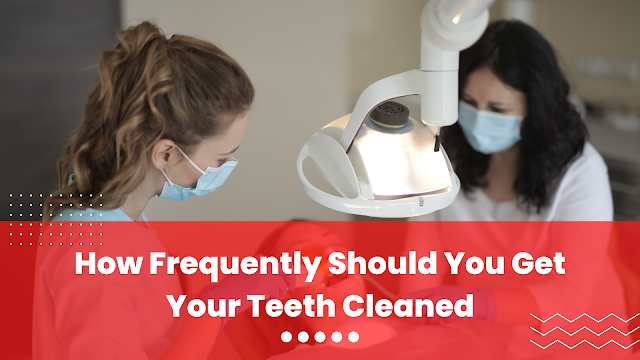How Frequently Should You Get Your Teeth Cleaned
Cleaning teeth is as much important as any other body part. One must take their oral hygiene as an essential issue. Generally, one must make an appointment every six months and get their teeth cleaned to avoid a dental emergency.
How to care for your teeth between cleanings?
Every dental patient is responsible for providing for their oral health to maintain a healthy mouth. Dental patients must adequately clean their teeth at least twice daily using fluoride toothpaste and a soft-bristled toothbrush.
Additionally, they have to floss their teeth at least once every day. Further, using a high-quality mouthwash can help maintain fresh breath and prevent the growth of harmful germs.
- Smoke
- Have diabetes
- Have a history of gum disease in the family
Do more regular professional cleanings of your teeth have any drawbacks?
No extensive study can answer the query "how much is too much" in brushing your teeth. It's conceivable that undergoing the treatment too frequently can harm your tooth enamel or make your teeth more sensitive.
Additionally, regular teeth cleaning might be costly as you'll probably have to start paying out of pocket entirely. More than two tooth cleaning treatments per year are likely not covered by even the most comprehensive dental insurance.
In general, your dentist should be able to tell you if getting your teeth cleaned more frequently than twice a year would be beneficial.
What happens while the teeth cleaning process?
These are the fundamental phases of a tooth cleaning appointment, although the process may differ across dentists. Typically, the entire process takes around an hour. Before you start, you can lightly numb your teeth and gums if you have sensitive teeth.
Cleaning of teeth
Tartar and plaque are removed from your teeth during this procedure, commonly called scaling. The hardest-to-reach parts of your mouth will be cleaned by your dentist or dental hygienist using specialized instruments to remove tough plaque. They will also use specialized tools and floss to clean the areas between your teeth.
Brightening
Your teeth are then polished. Your dentist will use a spinning head and dental paste to get your teeth as spotless as possible.
Fluoride treatment
Your teeth may receive fluoride treatment from a dentist or dental hygienist to prevent cavities. The fluoride treatment might come from a paste, gel, or varnish.
After the cleaning, they could talk to you about good dental hygiene and suggest some home care items for your teeth.
Not all dental emergencies can be delayed, so it is advisable to keep a number of emergency dentists 24/7.



.jpg)
Comments
Post a Comment